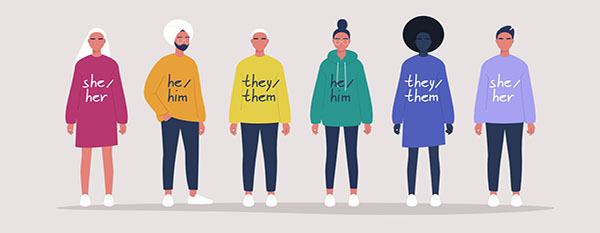Diversity, Equity, and Inclusion (DEI) initiatives are a growing practice in many organizations. A survey from WorldatWork found that “more than eight in 10 (83%) of organizations say they have been taking action on DEI initiatives in 2021, a 13 percentage-point increase from 2020.” However, the “I” or the “Inclusion” aspect of the DEI initiatives is often lacking. An article published by Workable reports that while many companies focus on diverse hiring practices and creating “diverse teams and workplaces,” they spend less time creating an environment that is inclusive, welcoming, and safe for underrepresented employees.
There is a plethora of resources available to help employers cultivate more inclusive spaces for People of Color, LGBTQ+ individuals, and other underrepresented groups. A starting point for increasing inclusive practices is to reflect on and implement more inclusive language in workspaces. A simple way to do this is to normalize sharing and asking for personal pronouns in the workplace rather than assuming an employee’s or coworker’s gender identity. Pronouns.org, an educational website about personal pronouns, emphasizes that “using someone’s correct personal pronouns is a way to respect them and create an inclusive environment, just as using a person’s name can be a way to respect them.” Many individuals in professional settings have started to share their pronouns in email signatures (see an example below), during meetings, or on social media pages. Pronouns.org also has an extensive list of gender inclusive language that can be substituted for language which might misgender or cause harm to an individual. Utilizing more gender inclusive language is a beginning step towards creating an environment where all employees feel respected, valued, and able to be themselves.
Personal pronouns are crucial to consider as they relate to investigative work and best practices. Investigators should consider the language they use in interviewing witnesses and writing investigative reports, as this is a common area where misgendering may occur. There are multiple ways to avoid misgendering, including exchanging pronouns during an introduction or directly asking witnesses about their pronouns along with other background questions. The February 2022 Gender Identity and Gender Inclusive Best Practices for Investigators webinar from the Association of Workplace Investigators provides additional resources related to incorporating gender diversity and inclusion into investigative practices as well as suggestions for thoughtful, inclusive communication.
Resources to Learn More About Gender Inclusive Practices in the Workplace:
- Pronouns.org website: Pronouns.org Resources on Personal Pronouns – this website offers a more thorough exploration of personal pronouns and addresses commonly asked questions
- BetterUp Article: What Gender Inclusive Means, and Why Your Use of Pronouns Matters
– this article provides a longer description of gender identity as well as the benefits of promoting gender diversity in the workplace
-
American Association of University Women DEI Toolkit: DEI Toolkit: Gender & Gender Identity – this toolkit includes definitions for gender and gender identity (among other DEI topics) as well as a list of helpful resources and reading suggestions for further education
-
Association of Workplace Investigations Webinar: Gender Identity and Gender Inclusive Best Practices for Investigators – this webinar focuses on how to incorporate gender diversity into investigative practices using thoughtful, inclusive communication
-
PrideTraining.org: Pronouns 101 – this website has a chart with the most common pronouns used as well as suggestions for how to be a good ally to the LGBTQ+ community

